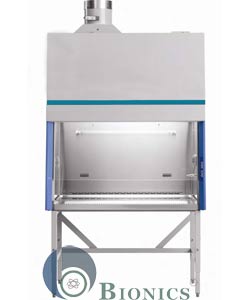The Qualities of an Ideal Class 2 Biosafety Cabinets
The Qualities of an Ideal Class 2 Biosafety Cabinets
Blog Article
Class 2 Biosafety Cabinets: Essential Equipment for Laboratory Safety and Microbiological Containment

In today’s scientific and clinical labs, safety for personnel and samples is non-negotiable. Whether it's handling live pathogens or sensitive diagnostics, biosafety cabinets play an integral role in contamination prevention and sample integrity.
Of all types, Class 2 cabinets are most commonly used due to their efficiency and versatility. These units are indispensable tools for pathogen handling and biological research.
Biosafety Cabinets – How They Work and Why They Matter
Biosafety cabinets are airflow-controlled workspaces engineered for microbiological safety. They use advanced filters to trap harmful particles before air re-enters the lab.
These units are generally classified into three main types: Class I, II, and III based on containment level. Among these, Class 2 biosafety cabinets are the standard choice for most applications.
Defining Class 2 Biosafety Cabinets and Their Role
Class 2 Biosafety Cabinets offer simultaneous protection for people, processes, and surroundings. They direct filtered airflow in a laminar pattern over the work surface.
Both incoming and outgoing air are HEPA-filtered to maintain sterility and prevent leaks. These cabinets are ideal for work involving moderate-risk pathogens (BSL-2/3).
Essential Features of Class 2 Safety Cabinets
A Class 2 microbiological safety cabinet includes several integrated safety mechanisms such as:
• HEPA/ULPA filtration to trap microbes and particles
• Uniform downward airflow to protect the sample zone
• Inward airflow to keep aerosols contained
• Optional UV lights for overnight sterilisation
• Low sound emissions to reduce fatigue
• Front glass for full control and protection
These elements support lab workers in maintaining sterile working environments.
Where Class 2 Cabinets Are Used
Class 2 Biosafety Cabinets are commonly used across microbiology, biotechnology, diagnostics, and pharma. They are ideal for safe handling of samples during testing and experimentation.
From universities to private pathology labs, Class 2 cabinets ensure lab hygiene and sample integrity.
Benefits of Using Class 2 Biosafety Cabinets
Using Class 2 cabinets offers significant improvements in contamination control and user safety:
• Reduces the risk of Biosafety Cabinets sample cross-contamination and error
• Acts as a barrier between user and biohazard
• Improves environmental safety by filtering outgoing air
These cabinets help labs meet safety regulations while maintaining workflow.
Regulatory Standards for Class 2 Cabinets
Top manufacturers design units compliant with major biosafety regulations worldwide. Class 2 units are sub-classified as A1, A2, B1, and B2—each with distinct airflow and exhaust features.
• Type A2: Recirculates 70% and exhausts 30% of filtered air
• Type B2: Suited for labs dealing with toxic agents
Matching the cabinet type to your process is essential.
Tips for Purchasing the Ideal Biosafety Cabinet
Before purchasing, consider:
• The types of agents and materials handled
• Cabinet dimensions, ducting needs, and room layout
• Energy consumption and maintenance frequency
• Service network and part availability
Partnering with a trusted provider helps meet both performance and safety needs.
Installation and Safety Guidelines
For optimal results:
• Avoid placing near doors, vents, or fans
• Schedule regular performance checks
• Train users in proper techniques and precautions
Operational best practices include:
• Use gloves, gowns, and face shields while operating
• Work calmly to prevent airflow disturbances
• Wipe work areas with disinfectants regularly
• Never activate UV when humans are present
Final Thoughts on Class 2 Biosafety Cabinets
Class 2 biosafety cabinets are vital equipment in laboratories dealing with biohazards. They safeguard both research outcomes and operator health.
From pathology labs to advanced genetic testing, Class II cabinets copyright the highest biosafety levels. When investing in a biosafety cabinet, opt for trusted brands that offer end-to-end service—because safe science starts with smart containment. Report this page